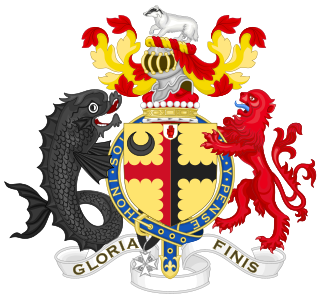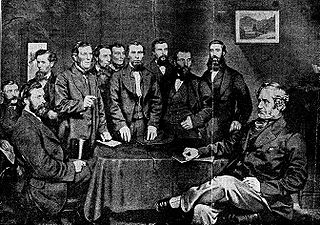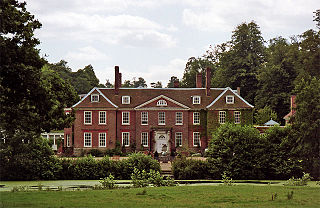
Marquess of Aberdeen and Temair, in the County of Aberdeen, in the County of Meath and in the County of Argyll, is a title in the Peerage of the United Kingdom. It was created on 4 January 1916 for John Hamilton-Gordon, 7th Earl of Aberdeen.
Douglas, occasionally spelt Douglass, is a Scottish surname. It is thought to derive from the Scottish Gaelic dubh glas, meaning "black stream". There are numerous places in Scotland from which the surname is derived. The surname has developed into the given name Douglas. Douglas is a habitational name, which could be derived from any of the many places so-named. While there are numerous places with this name in Scotland, it is thought, in most cases, to refer to Douglas, South Lanarkshire, the location of Douglas Castle, the chief stronghold of the Lords of Douglas. The Scottish Gaelic form of the given name is Dùbhghlas[ˈt̪uːl̪ˠəs̪]; the Irish-language forms are Dúghlas and Dubhghlas, which are pronounced [ˈd̪ˠuːɣlˠəsˠ]. According to George Fraser Black, in southern Argyllshire the surname is an Anglicised form of the surnames MacLucas, MacLugash.

Earl of Kintore is a title in the Peerage of Scotland. It was created in 1677 for Sir John Keith, third son of William Keith, 6th Hereditary Earl Marischal of Scotland and Chief of Clan Keith. He was made Lord Keith of Inverurie and Keith Hall at the same time, also in the Peerage of Scotland. At the death of William, the 4th Earl, in 1761, the Earldom and Lordship became dormant, as no-one could prove a claim to them. In 1778, it was decided that the Earldom, Lordship and Chieftaincy of Clan should pass to Anthony Adrian Falconer, Lord Falconer of Halkerton, who changed his surname to Keith-Falconer. The Lordship Falconer of Halkerton and the Earldom of Kintore and Lordship Keith of Inverurie and Keith Hall remained united until 1966, when, at the death of the 10th Earl, the Lordship Falconer of Halkerton became dormant.

Earl of Mount Edgcumbe is a title in the Peerage of Great Britain. It was created in 1789 for George Edgcumbe, 3rd Baron Edgcumbe. This branch of the Edgcumbe family descends from Sir Piers Edgcumbe of Cotehele in Cornwall, who acquired an estate near Plymouth through marriage in the early 16th century, which was later re-named "Mount Edgcumbe". His descendant Richard Edgcumbe was a prominent politician and served as Paymaster-General of Ireland and as Chancellor of the Duchy of Lancaster. In 1742, he was created Baron Edgcumbe, of Mount Edgcumbe in the County of Devon, in the Peerage of Great Britain. Richard Edgcumbe was succeeded by his eldest son, the second Baron. He represented Plympton Erle, Lostwithiel and Penrhyn in the House of Commons and served as Lord-Lieutenant of Cornwall. On his death, the title passed to his younger brother, the third Baron. He was an Admiral of the Blue and also held political office as Treasurer of the Household and as Captain of the Honourable Band of Gentlemen Pensioners. In 1781, he was created Viscount Mount Edgcumbe and Valletort and in 1789 he was further honoured when he was made Earl of Mount Edgcumbe. Both titles are in the Peerage of Great Britain.

Earl Lloyd-George of Dwyfor is a title in the peerage of the United Kingdom. It was created in 1945 for Liberal parliamentarian David Lloyd George who served as Chancellor of the Exchequer from 1908 to 1915 and Prime Minister of the United Kingdom from 1916 to 1922. He was created Viscount Gwynedd, of Dwyfor in the County of Caernarvon, also in the peerage of the United Kingdom, at the same time.

Lord Elibank, of Ettrick Forest in the County of Selkirk, is a title in the Peerage of Scotland. It was created in 1643 for Sir Patrick Murray, 1st Baronet, with remainder to his heirs male whatsoever. He had already been created a Baronet, of Elibank, in the Baronetage of Nova Scotia in 1628. His great-great-grandson, the fifth Lord, was an author and economist. He was succeeded by his younger brother, the sixth Lord, who was an admiral in the Royal Navy. On his death the titles passed to his nephew, the seventh Lord. He represented Peeblesshire in the House of Commons and also served as Lord Lieutenant of Peeblesshire.

Viscount Hawarden is a title in the Peerage of Ireland.

Viscount Brookeborough, of Colebrooke in the County of Fermanagh, is a title in the Peerage of the United Kingdom. It was created in 1952 for the Ulster Unionist politician and Prime Minister of Northern Ireland, Captain The Rt. Hon. Sir Basil Brooke, 5th Bt., P.C. (N.I.), M.P.

Viscount Chilston, of Boughton Malherbe in the County of Kent, is a title in the Peerage of the United Kingdom. It was created in 1911 for the Conservative politician and former Home Secretary, Aretas Akers-Douglas. The title derives from Chilston Park, Akers-Douglas's country house in Kent. He was made Baron Douglas of Baads, in the County of Midlothian, at the same time, also in the Peerage of the United Kingdom. His son, the second Viscount, served as British Ambassador to Russia from 1933 to 1938. He was succeeded by his eldest surviving son, the third Viscount. As of 2010 the titles are held by the latter's first cousin once removed, the fourth Viscount, who succeeded in 1982. He is the grandson of the Hon. George Alexander Akers-Douglas, second son of the first Viscount.

Baron Penrhyn is a title that has been created twice. The first creation came in the Peerage of Ireland in 1783 in favour of Richard Pennant, who had previously served as a Member of Parliament for Petersfield and Liverpool. This creation became extinct on his death in 1808. The next creation came in 1866 in the Peerage of the United Kingdom when the Conservative politician Edward Douglas-Pennant was created Baron Penrhyn, of Llandegai in the County of Carnarvon. He had previously represented Carnarvon in the House of Commons and also served as Lord Lieutenant of Caernarvonshire. He was granted the estate of his father-in-law on the condition that he accepted his wife's maiden name, Pennant. Lord Penrhyn was the younger brother of The 17th Earl of Morton. In 1833 he had married Juliana Isabella Mary Pennant, eldest daughter and co-heiress of George Hay Dawkins-Pennant of Penrhyn Castle and in 1841 he assumed by Royal licence the additional surname of Pennant.

The Carlton Club is a private members' club in St James's, London. It was the original home of the Conservative Party before the creation of Conservative Central Office. Membership of the club is by nomination and election only.

Aretas Akers-Douglas, 1st Viscount Chilston,, born Aretas Akers, was a British Conservative statesman who sat in the House of Commons from 1880 until he was raised to the peerage in 1911. He notably served as Home Secretary under Arthur Balfour between 1902 and 1905.

John Hugh Hare, 1st Viscount Blakenham, OBE, PC, DL was a British Conservative politician.
There have been two baronetcies created for members of the Orr-Ewing family, both in the Baronetage of the United Kingdom. Both creations are extant as of 2010.
Boughton Malherbe is a village and civil parish in the Maidstone district of Kent, England, equidistant between Maidstone and Ashford. According to the 2001 census the parish had a population of 428, including Sandway and Grafty Green, increasing to 476 at the 2011 Census.
Ian Stanley Akers-Douglas was an English amateur cricketer and rackets player. He was a right-handed batsman who played first-class cricket for Oxford University and Kent County Cricket Club between 1929 and 1938. He was born in Kensington and died at his home in Frant.
Aretas Akers-Douglas, 2nd Viscount Chilston,, was a British diplomat. He was Ambassador to the Soviet Union between 1933 and 1938.
James Douglas Stoddart Douglas was a British Conservative Party politician.

Chilston Park is a country house in Boughton Malherbe, Kent, England. Started in the 15th century, the house has been modified many times and is a Grade I listed building, currently operated as a country house hotel.